| | Donald Trump escalates his clash with Harvard, Kim Jong Un fumes about a failed warship launch, and ͏ ͏ ͏ ͏ ͏ ͏ |
| |   ABU DHABI ABU DHABI |   BEIJING BEIJING |   PYONGYANG PYONGYANG |
 | Flagship |  |
| |
|
The World Today | 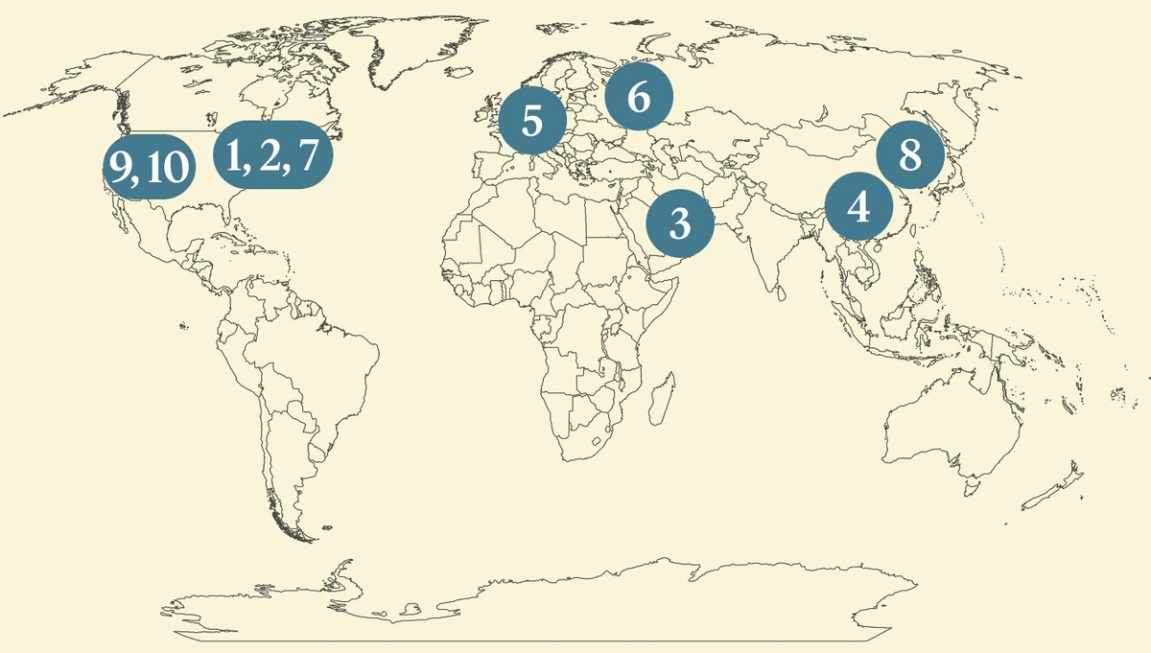 - Trump escalates Harvard fight
- US tax bill advances
- OpenAI’s Gulf push
- No winner in innovation race
- BYD outsells Tesla in EU
- Telegram makes a profit
- Goodbye, pennies
- NK’s failed warship launch
- Bringing back supersonic jets
- Pro-doping sporting event
 A bloody artifact from Abraham Lincoln’s assassination fetches more than $1 million at auction, and a Chinese temple of bureaucracy features in our latest Substack Rojak. |
|
US escalates clash with Harvard |
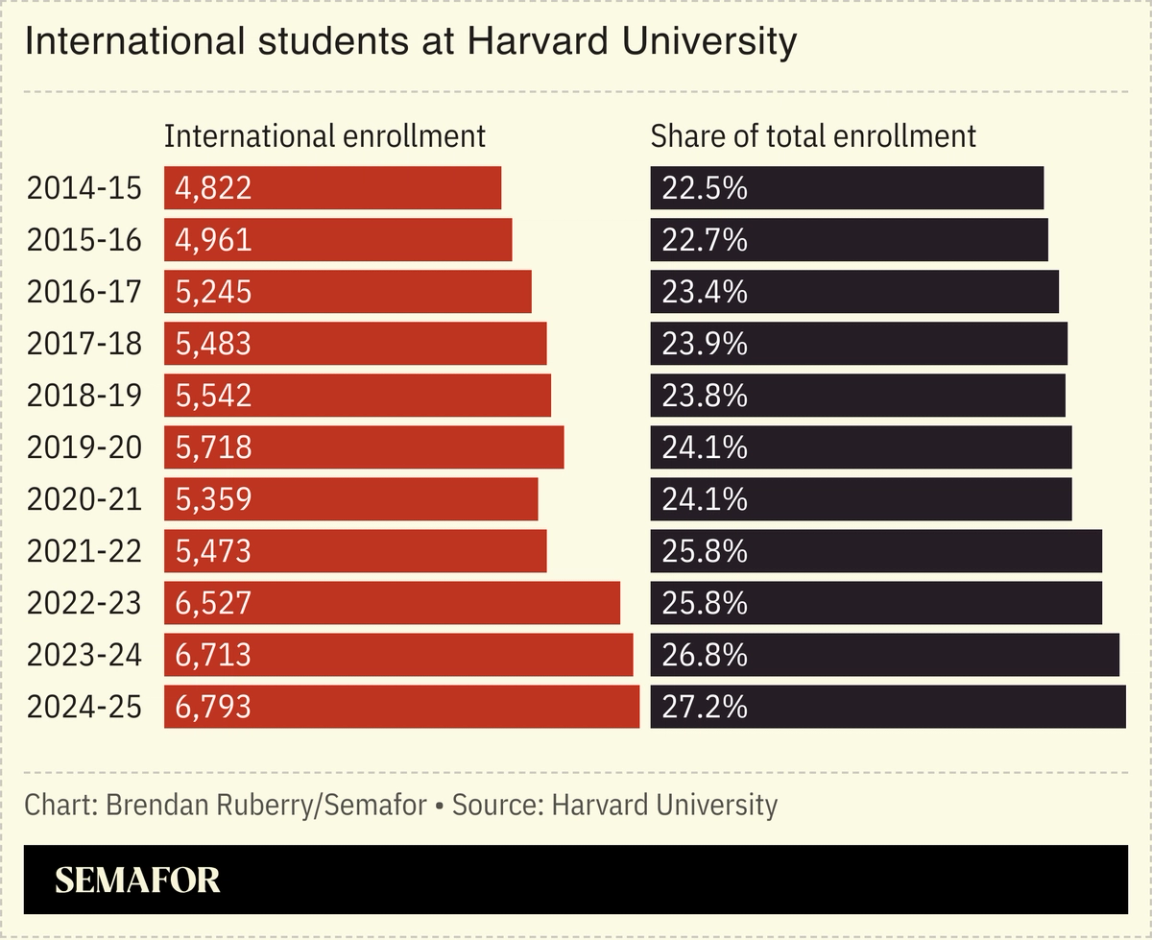 The Donald Trump administration on Thursday blocked Harvard University from enrolling international students, a major escalation in the White House’s conflict with the US’ oldest college. The government said it was terminating Harvard’s student visa program after the school rebuffed a request for information on its foreign students’ campus activities. Harvard will likely challenge the move in court. Academics have warned that Trump’s higher education crackdown will hinder the US in the global tech race. Stanford University researcher and the “godmother of AI” Fei-Fei Li told Semafor Wednesday it was crucial the US remain a “magnet” for international talent: “Continuing to nourish our higher education, our public sector, for this kind of innovative, blue sky, curiosity-driven research is critical.” |
|
Trump mega bill narrowly passes |
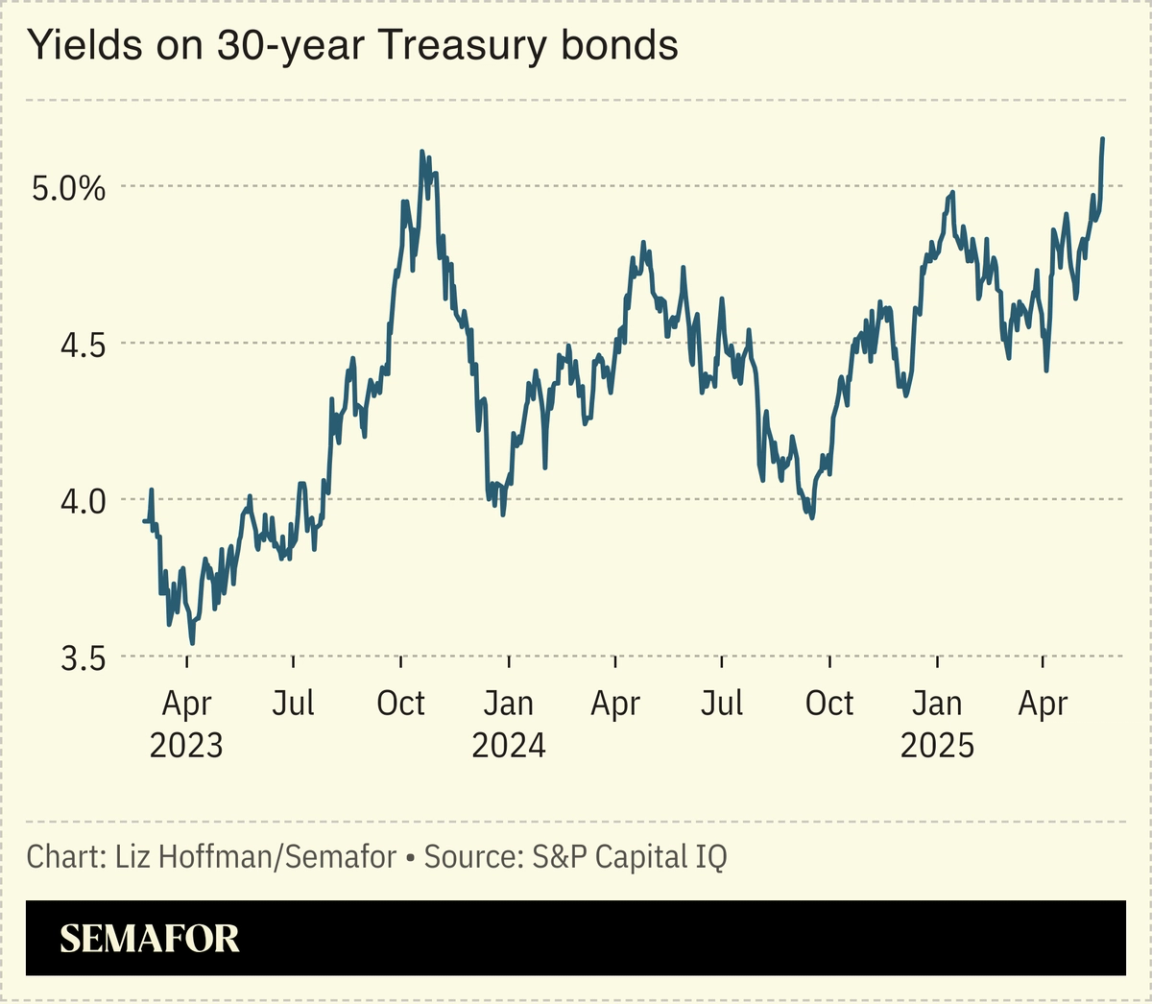 The US House narrowly passed Republicans’ sweeping tax and spending package on Thursday, though Wall Street appears less enthusiastic about the so-called “big, beautiful bill.” The legislation now advances to the Senate, marking a major win for President Donald Trump and his economic agenda, but the package still faces hurdles: The bill would necessitate trillions of dollars in new borrowing, spurring concern among analysts and corporate leaders. Yields on 30-year US Treasury bonds hit their highest levels since 2007, before stabilizing. Spiraling yields “will become a problem quite quickly,” one investor told Semafor. “It’s not a theoretical exercise. The math breaks down… If the market wants to force discipline, it can do that.” |
|
OpenAI plans UAE data center expansion |
 Brian Snyder/Reuters Brian Snyder/ReutersOpenAI plans to build a massive artificial intelligence data center in Abu Dhabi, the company’s first large-scale project outside the US. The project, in partnership with United Arab Emirates firm G42, aims to become one of the most powerful AI computing clusters, reaching a capacity of 1 gigawatt. The US and UAE are deepening their AI partnership: US President Donald Trump recently agreed to give the UAE expanded access to advanced AI chips, and has championed the data center plans as a way to develop an edge over China in the region. But some US officials worry about what they see as an offshoring of American AI capabilities, and a lack of guarantees to limit Beijing’s access to the chips. |
|
No leader in US-China innovation race |
 Ann Wang/Reuters Ann Wang/ReutersThe US leads China in artificial intelligence and quantum computing innovations, while Beijing is ahead in semiconductors — and Europe lags in all three fields, an AI-aided analysis found. Bruegel researchers used large language models to analyze patents and identify “radical novelties,” groundbreaking concepts repeated in at least five other patents. AI innovations, the report found, spread fastest between the three contenders, with the EU being slowest to replicate foreign innovations. Perhaps surprisingly, the US and China were quick to replicate each other’s technological ideas despite Washington’s export controls, showing their ecosystems are “far more integrated with one another than they are with the EU.” As the superpowers grapple for tech supremacy, Bruegel found no “overall frontrunner in the innovation race.” |
|
BYD overtakes Tesla in Europe |
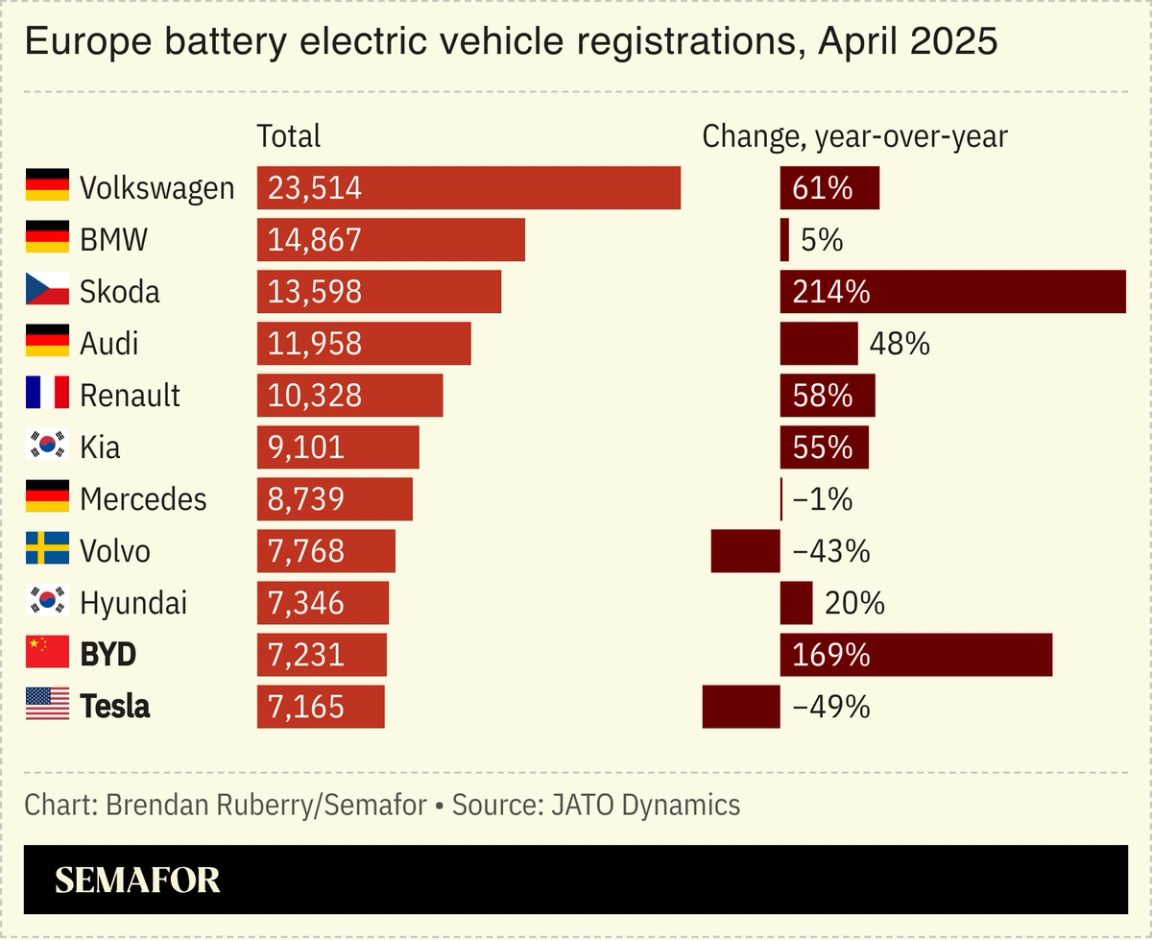 Chinese electric vehicle giant BYD outsold Tesla in Europe for the first time last month, in what one analyst called a “watershed moment” for the continent’s car market. BYD’s sales jumped nearly 170% compared to April last year, while Tesla sales slumped as CEO Elon Musk’s high-profile role in the White House and support for far-right European parties sparked global anti-Tesla protests. BYD is a relative newcomer in Europe, but has made inroads through increased sales of plug-in hybrids, which aren’t subject to the European Union’s high tariffs on Chinese EVs. But BYD’s aggressive expansion is facing challenges elsewhere: Automakers in Brazil are urging the government to immediately increase tariffs to keep the Chinese company from building up inventory. |
|
 Pawel Walerjewitsch Durow/Wikimedia Commons. CC BY 2.0 Pawel Walerjewitsch Durow/Wikimedia Commons. CC BY 2.0Telegram’s profit jumped to $540 million last year despite the arrest of its founder in August. The messaging app achieved its first annual profit, the Financial Times reported, from a surge in paying users and its own cryptocurrency-related gains. But the charges brought by French authorities against CEO Pavel Durov — who was recently granted a temporary release — weigh on the company’s future: Officials said Telegram lacked proper content moderation and refused to turn over data on a child abuse investigation. Since Durov’s arrest, the app has been markedly more cooperative with government requests, 404 Media reported, providing data on more than 22,000 users in the first quarter of 2025. |
|
US moves forward with ending penny |
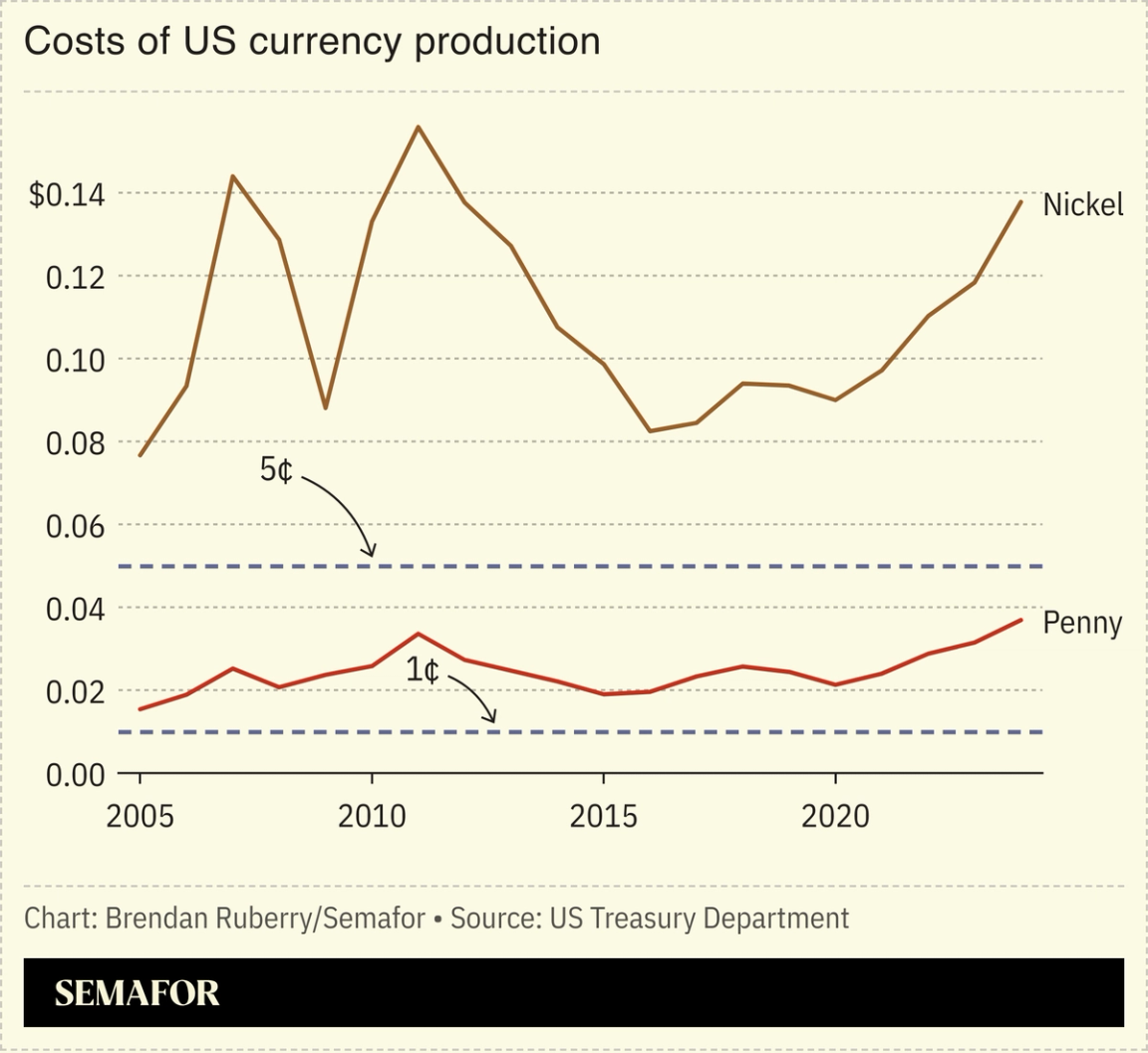 The US said it made its final order of blank pennies and will stop producing the coin when those run out. President Donald Trump in February ordered the US Treasury Department to stop making the 1-cent coin, calling the currency “wasteful”: Each penny costs almost 4 cents to produce, and officials predict an annual savings of $56 million once manufacturing stops. The nickel, though, costs more to make than the penny, so if the Mint increases production of the 5-cent coins to compensate for the pennies, the savings would be quickly wiped out, penny advocates argue. The total pennies currently in circulation are worth more than $1 billion, but their use has decreased as Americans shift to card and digital payments. |
|
 As electricity demand soars — driven by the rapid expansion of data centers and AI — pressure is mounting to scale secure and reliable energy resources. Join Semafor for a timely conversation with Rep. Brett Guthrie, R-Ky., and Aamir Paul, President of North American Operations at Schneider Electric, as they discuss how the new administration plans to accelerate domestic energy production—and whether current infrastructure is up to the task. The discussion will also explore the innovative policies and technologies that could help close the growing supply-demand gap. June 11, 2025 | Washington, DC | RSVP |
|
Kim fumes after failed warship launch |
 KCNA via Reuters KCNA via ReutersNorth Korean leader Kim Jong Un lashed out at his own military after the country’s newest warship was damaged in a failed launch. Kim, who was present at the ceremony that was meant to be a celebration, said the naval destroyer partially capsized because of “absolute carelessness,” characterizing it as a “criminal act.” The botched launch was an embarrassing setback for North Korea’s efforts to modernize its naval forces amid perceived threats from the US and South Korea. But Pyongyang’s rare move of acknowledging the mishap shows that Kim wants to project seriousness about deploying larger ships and confidence that the country can eventually build a greater navy, a Seoul-based expert said. |
|
Supersonic flights could make comeback |
 Boom Supersonic Boom SupersonicLawmakers are looking to repeal a law banning supersonic flight over the US mainland. The 1973 law was a significant factor in Concorde’s eventual demise: Supersonic flight was only possible over water, severely limiting the routes the aircraft could offer. But modern aerodynamic technology makes much quieter supersonic flight possible. The CEO of Boom Supersonic — a startup backed by OpenAI’s Sam Altman — argued that “supersonic flight without an audible sonic boom should obviously be allowed.” The bipartisan bill would permit flights as long as “no sonic boom reaches the ground.” Boom has test-flown a prototype, which travels significantly slower than Concorde but faster than sound, while NASA and Lockheed Martin are soon planning to try out their own. |
|
Enhanced Games embraces doping |
 Enhanced Games athlete Kristian Gkolomeev. Novak Djurovic/Reuters Enhanced Games athlete Kristian Gkolomeev. Novak Djurovic/Reuters |
|
|